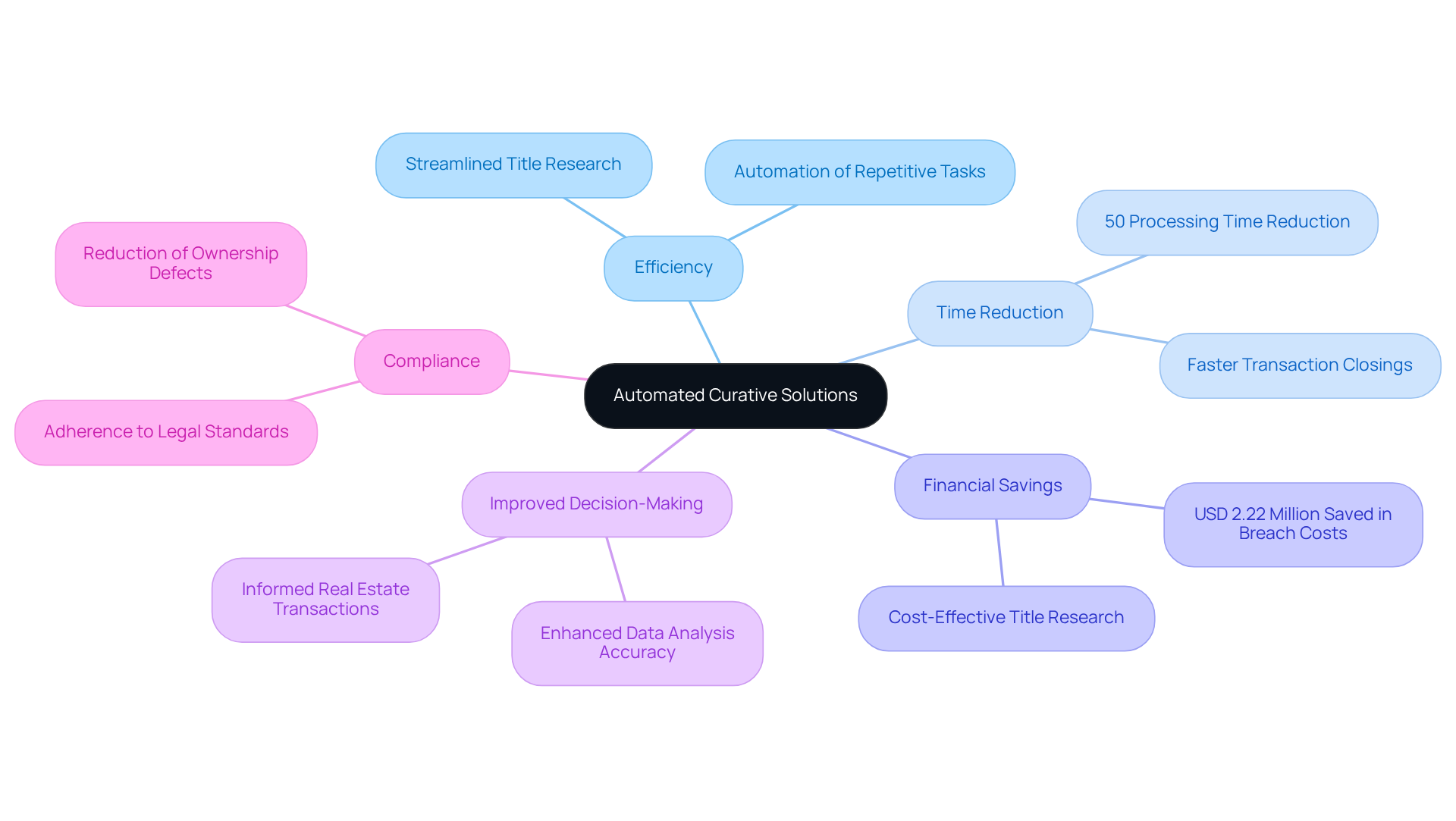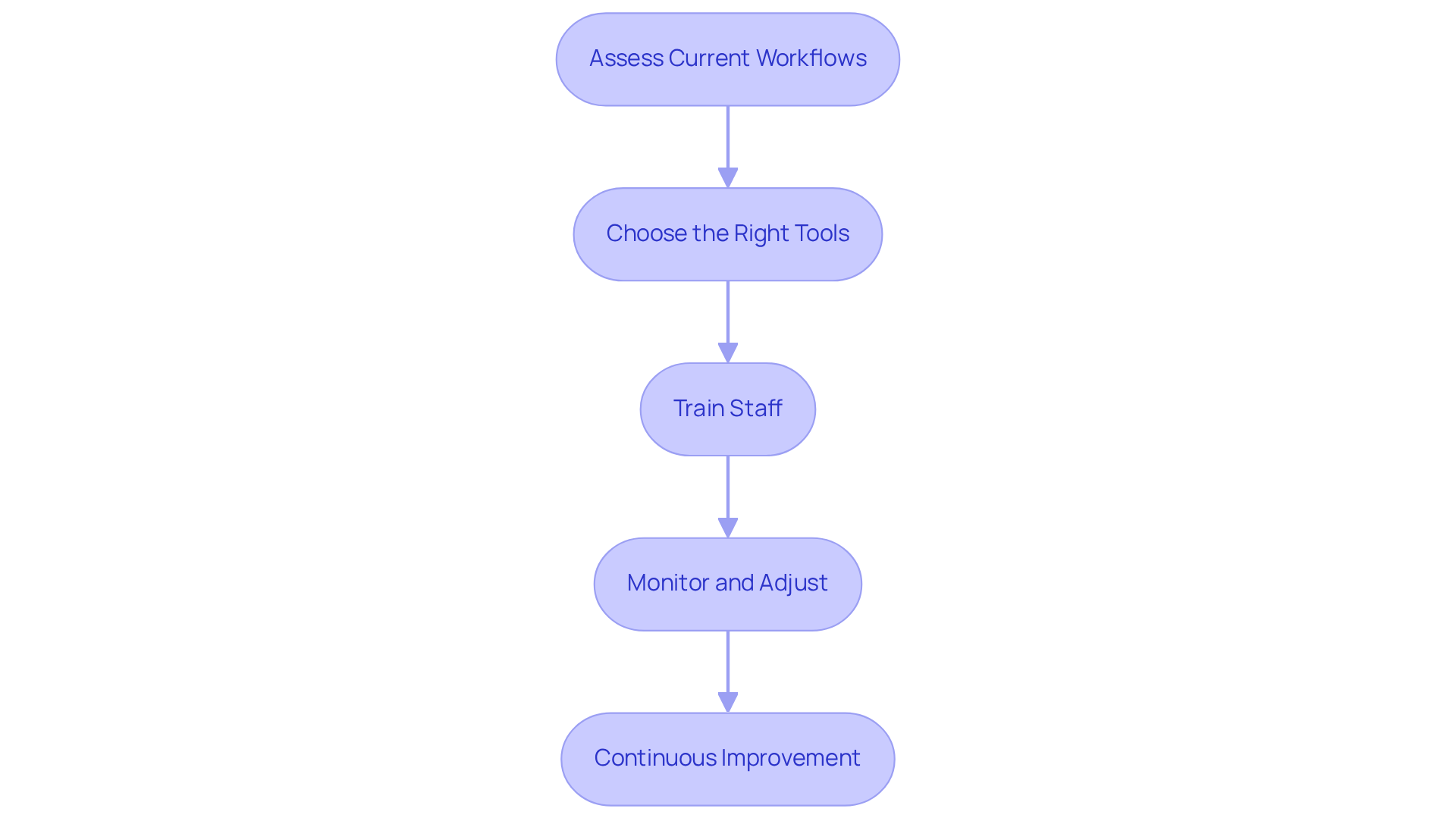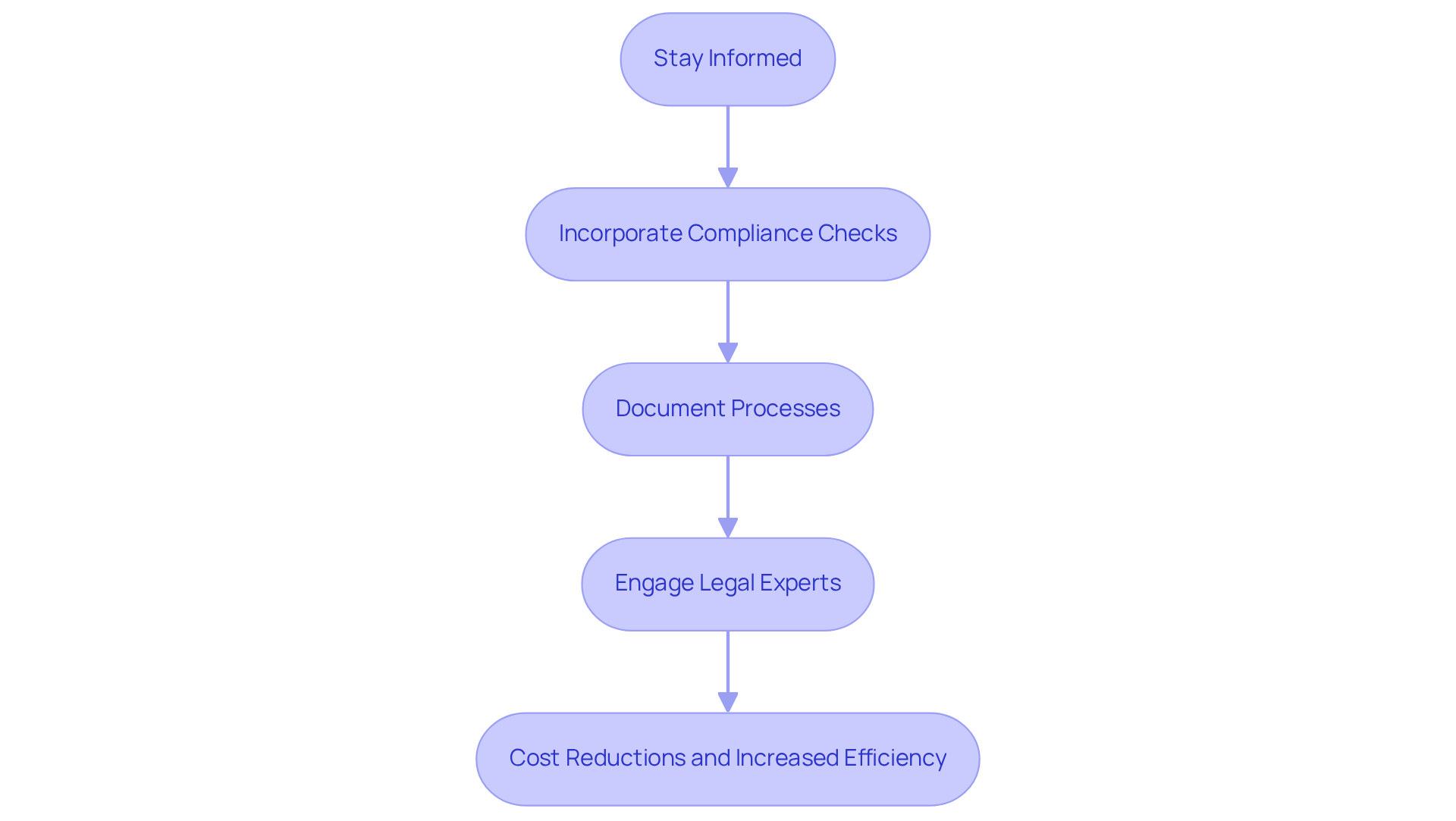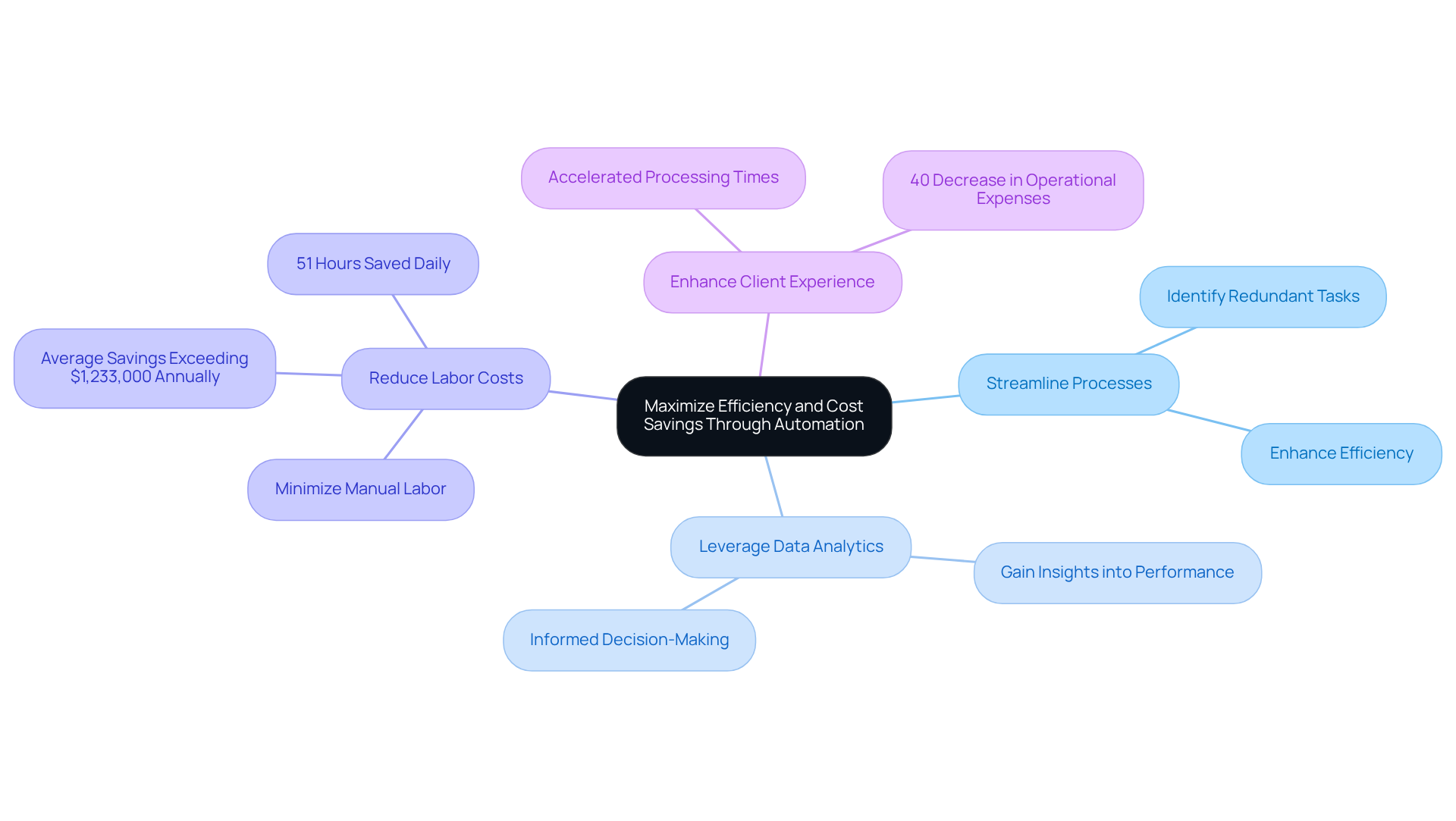Overview
Automated curative solutions are essential for title firms, enhancing efficiency and ensuring compliance by streamlining the resolution of ownership defects in real estate transactions. These solutions significantly reduce processing times by up to 50%, while also lowering compliance-related incidents. This demonstrates their effectiveness in improving operational performance and client satisfaction. Furthermore, the implementation of such solutions not only addresses the challenges faced in accurate title research but also reinforces the reliability of the services offered, ultimately driving the industry towards a more efficient future.
Introduction
Automated curative solutions are revolutionizing the operations of title firms by effectively addressing the persistent challenges of ownership defects that can stall real estate transactions. By harnessing cutting-edge technologies such as machine learning and optical character recognition, these solutions enhance efficiency and ensure compliance with legal standards. This transformation is reshaping the landscape of title research.
However, as firms navigate this technological shift, a critical question emerges: how can they implement these automated systems effectively to maximize benefits while minimizing risks?
Understand Automated Curative Solutions and Their Importance
Automated curative solutions for title firms are essential for streamlining the identification and resolution of ownership defects that frequently impede real estate transactions. By leveraging advanced technologies such as machine learning and optical character recognition, these solutions can swiftly and accurately analyze extensive document data. This allows legal organizations to significantly reduce the time spent on curative actions, enabling them to concentrate on more complex matters requiring human expertise.
The significance of automated curative solutions for title firms is underscored by their capability to enhance overall efficiency in title research, reduce delays in transaction closings, and ensure compliance with legal standards. For instance, firms that utilize automated curative solutions for title firms have reported processing time reductions of up to 50%, leading to faster closings and increased client satisfaction.
Furthermore, organizations employing AI and automation for security prevention have saved an average of USD 2.22 million in breach costs, underscoring the financial advantages of these technologies. Case studies illustrate that the integration of machine learning not only accelerates defect resolution but also improves data analysis accuracy, ultimately resulting in more informed decision-making in real estate transactions.
The case study "Parse AI: Revolutionizing Title Research" specifically showcases how Parse AI tackles challenges in confirming real property ownership, delivering significant cost savings compared to traditional methods. As the sector evolves, the importance of automated curative solutions for title firms in research becomes increasingly apparent, empowering companies to better meet the demands of a fast-paced market.

Implement Best Practices for Automation in Title Research
To efficiently implement mechanization in title research, companies must adhere to several best practices:
- Assess Current Workflows: Conduct a thorough analysis of existing processes to identify areas where mechanization can provide substantial improvements. Utilizing Parse AI's advanced machine learning tools can expedite document processing and interpretation, allowing companies to detect inefficiencies more effectively.
- Choose the Right Tools: Select mechanization solutions that cater to your firm's unique requirements, ensuring seamless integration with existing software systems. Parse AI's robust title research processing capabilities can extract essential information from title documents, thereby enhancing the accuracy and speed of operations.
- Train Staff: Provide comprehensive training for staff members, equipping them with the necessary skills to leverage new technologies effectively and appreciate the benefits of automation. With Parse AI's , staff can swiftly learn to annotate documents and extract information from unstructured data.
- Monitor and Adjust: Regularly assess the performance of mechanical processes and be prepared to implement adjustments to optimize efficiency. For example, a title firm that implemented automated curative solutions for title firms experienced an impressive 30% increase in productivity within the first quarter, highlighting the efficacy of these best practices. This aligns with broader industry trends, where companies employing automated curative solutions for title firms report significant gains in productivity and operational efficiency. Moreover, it is crucial to note that 66% of knowledge workers report enhanced productivity due to technological advancements, underscoring its potential impact. Firms should also recognize that 30-50% of initial RPA projects fail, emphasizing the necessity for meticulous planning and execution. Parse AI's dedication to continuous improvement through collaboration with land service professionals further underscores the importance of teamwork in the automation process.

Ensure Compliance with Legal and Regulatory Standards
Ensuring adherence to legal and regulatory standards is crucial when implementing automated curative solutions for title firms. To achieve this, firms should take the following steps:
- Stay Informed: Regularly update knowledge on relevant laws and regulations that impact title research and automation. This proactive method assists companies in managing the complexities of compliance effectively.
- Incorporate Compliance Checks: Integrate compliance checks into automated workflows to ensure that all actions remain within legal boundaries. For example, title firms that have implemented automated curative solutions for title firms with embedded compliance checks into their processes have reported a remarkable 94.7% reduction in compliance-related incidents, highlighting the effectiveness of this practice. Furthermore, organizations that implement compliance automation can achieve an average reduction in compliance-related incidents, further reinforcing the importance of these measures.
- Document Processes: Maintain comprehensive documentation of systematized processes to enhance transparency and accountability. This practice not only aids in compliance audits but also fosters trust among stakeholders.
- Engage Legal Experts: Consult with legal professionals to review mechanized systems and ensure they meet all regulatory requirements. Involving specialists can offer perspectives on legal criteria that are essential for firms employing automated processes.
A notable case involved Parse AI, which integrated compliance checks into its automated workflows for title document processing. This integration led to considerable cost reductions and efficiency enhancements, showcasing the importance of within operational strategies to improve efficiency and reduce risks.

Maximize Efficiency and Cost Savings Through Automation
Maximizing efficiency and cost savings through automation involves several key strategies:
- Streamline Processes: Identify and eliminate redundant tasks within title research workflows to enhance efficiency. This approach significantly reduces processing times and improves overall productivity.
- Leverage Data Analytics: Utilize data analytics to gain insights into operational performance, enabling companies to identify areas for improvement. This data-driven methodology leads to more and strategic adjustments.
- Reduce Labor Costs: Automating routine tasks minimizes reliance on manual labor, resulting in substantial cost savings. For instance, companies that have embraced mechanization report average savings exceeding $1,233,000 annually. Moreover, Brendan MacDonald noted that on the first day of live operations, automated processes saved 51 hours daily—equivalent to the work of six individuals on an eight-hour shift.
- Enhance Client Experience: Accelerated processing times and improved accuracy contribute to higher client satisfaction, potentially leading to increased business opportunities. A company that automated its document search process witnessed a remarkable 40% decrease in operational expenses, underscoring the financial advantages of adopting automation.
By integrating these strategies, title firms can not only enhance their operational efficiency but also utilize automated curative solutions for title firms to position themselves for sustainable growth in a competitive market.

Conclusion
Automated curative solutions are revolutionizing the landscape of title firms, enabling them to streamline processes, enhance efficiency, and ensure compliance with legal standards. By embracing advanced technologies such as machine learning and automation, title firms can effectively address ownership defects and expedite real estate transactions. This ultimately leads to improved client satisfaction and operational success.
The article underscores several key aspects of automation, including its capacity to:
- Reduce processing times by up to 50%
- Significantly lower costs
- Enhance decision-making through precise data analysis
Best practices for implementing these solutions—such as assessing current workflows, selecting appropriate tools, and providing thorough training—are essential for maximizing the benefits of automation. Furthermore, the integration of compliance measures within automated processes mitigates risks and fosters trust, showcasing the holistic advantages of adopting these innovative technologies.
As the real estate industry continues to evolve, the significance of automated curative solutions cannot be overstated. Firms that prioritize the adoption of these technologies stand to gain a competitive edge, driving efficiency and cost savings while navigating the complexities of compliance. Embracing automation is not merely a trend; it is a strategic imperative that empowers title firms to thrive in an increasingly demanding market.
Frequently Asked Questions
What are automated curative solutions for title firms?
Automated curative solutions are technologies designed to streamline the identification and resolution of ownership defects in real estate transactions, utilizing advanced technologies like machine learning and optical character recognition.
How do automated curative solutions benefit title firms?
They enhance overall efficiency in title research, reduce delays in transaction closings, ensure compliance with legal standards, and allow firms to focus on more complex matters that require human expertise.
What impact do automated curative solutions have on processing times?
Firms utilizing automated curative solutions have reported processing time reductions of up to 50%, which leads to faster closings and increased client satisfaction.
What financial advantages do organizations gain from using AI and automation in curative processes?
Organizations employing AI and automation for security prevention have saved an average of USD 2.22 million in breach costs, highlighting the financial benefits of these technologies.
How does machine learning improve the process of title research?
The integration of machine learning accelerates defect resolution and improves data analysis accuracy, resulting in more informed decision-making in real estate transactions.
Can you provide an example of a case study related to automated curative solutions?
The case study "Parse AI: Revolutionizing Title Research" showcases how Parse AI addresses challenges in confirming real property ownership, delivering significant cost savings compared to traditional methods.
Why is the importance of automated curative solutions increasing in the real estate sector?
As the sector evolves, the need for efficient and accurate title research becomes more critical, empowering companies to meet the demands of a fast-paced market effectively.




